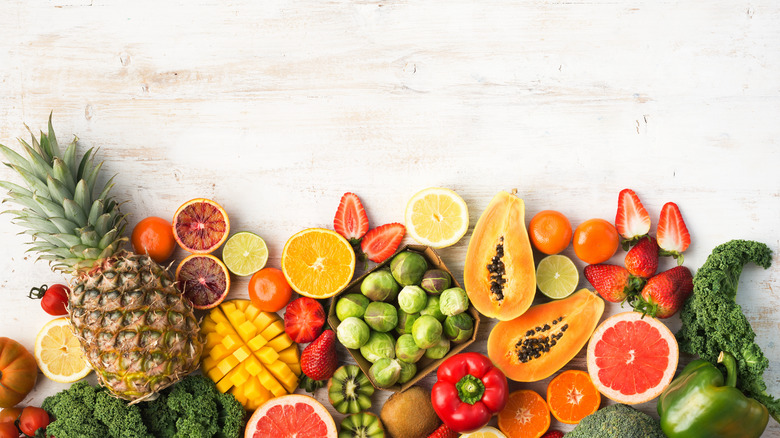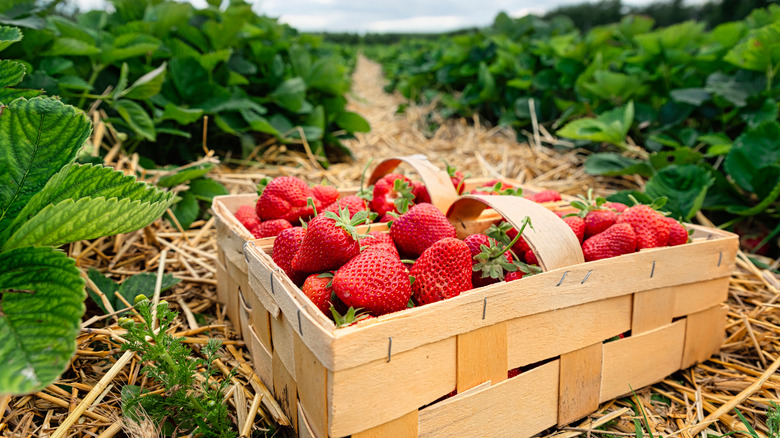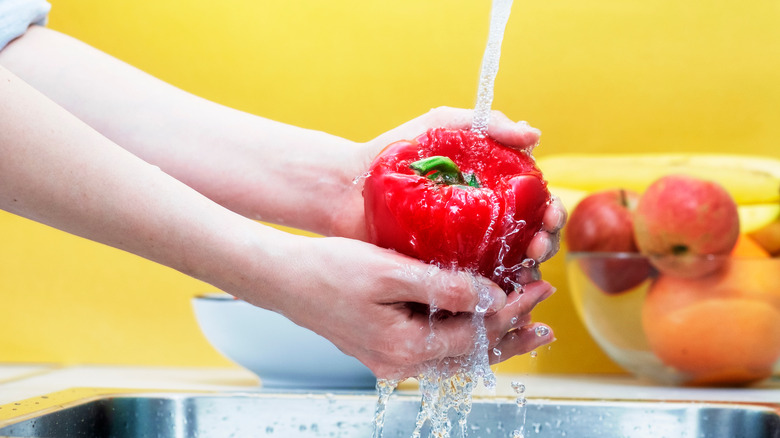Out Of All Produce, A New Report Found This Fruit Contains The Most Pesticides
It can seem harder and harder these days to find foods that are free of chemicals like pesticides and herbicides, additions to the food supply that some scientists say are affecting our health as well as the health of the environment (via Frontiers in Public Health). More consumers are responding to the use of such chemicals by opting to buy organic, with Supermarket News reporting sales of organic products in the United States grew by more than 12% in 2020, an increase that was more than double the industry's growth in 2019.
Buying organic is great, but it can also be expensive: organic foods are almost always pricier than nonorganic options, ranging from 7% to a whopping 82% higher in price according to a 2016 report from the United States Department of Agriculture (USDA). Not everyone can afford to buy organic all the time, so as an alternative, many shoppers rely on the Environmental Working Group (EWG), a nonprofit organization that advocates for agricultural and environmental standards, and its annual "Clean Fifteen" list of produce items that are tested by the USDA and found to be lowest in chemical residues (via EWG). This list helps consumers concerned about pesticide exposure to know when to select more affordable conventional produce and when to choose organic.
Every year, the EWG also publishes a companion "Dirty Dozen" list, a roundup of the 12 produce items that test highest for pesticides. The organization just posted its annual guides for 2022, and if you're a berry fan you might be disappointed in the results.
Strawberries, spinach, and other leafy greens top the "Dirty Dozen"
If you want to avoid consuming pesticides, you should probably make a note not to buy conventionally grown strawberries, spinach, and other leafy greens such as kale and collards. Those items top the EWG's 2022 Dirty Dozen list. Rounding out the list (in order) are nectarines, apples, grapes, peppers, cherries, peaches, pears, celery, and tomatoes. The news that strawberries have topped the list for 2022 isn't exactly a shock, as the fruit is often named the number one to avoid on the environmental nonprofit's yearly roundup.
"Everyone should eat plenty of fresh fruit and vegetables, no matter how they're grown," EWG Toxicologist Alexis Temkin said in a statement. "But shoppers have the right to know what potentially toxic substances are found on these foods, so they can make the best choices for their families, given budgetary and other concerns."
If you just can't cut out these delicious fruits and veggies, the EWG recommends buying organic versions of them. And for shoppers who prefer to buy conventional produce, the group's 2022 Clean Fifteen list cites avocado, corn, pineapple, onions, and papaya as some of the best conventional fruit and vegetable options available in supermarkets.
Critics say the EWG lists discourage healthy eating
Though shoppers trying to avoid pesticides entirely while saving a little money may be glad for the EWG's lists, critics call out the nonprofit for its methods. In a statement sent to Tasting Table, the Alliance for Food and Farming (AFF), a nonprofit that represents both conventional and organic farmers, shared its concern that the EWG is focusing it's energy in the wrong place. The AFF called out the Dirty Dozen list for discouraging healthy eating, writing that only one in 10 people living in the U.S. eat enough fruits and vegetables per day. This figure is supported by a CDC report published January 2022.
The AFF also takes issue with the methods used by the EWG. In the statement, the nonprofit's executive director Teresa Thorne called the Dirty Dozen list "inaccurate [and] fear-based." The nonprofit pointed to a study published in 2011 in the Journal of Toxicology, which criticized the science EWG used to measure pesticide residue levels. In addition to stating the pesticide levels present on produce are too low to negatively affect consumers, the study asserted there is no guarantee that organic produce will actually be entirely free of pesticide residue.
On the AFF's Safe Fruits and Veggies website, the nonprofit says you can "reduce and often eliminate residues" by following the FDA guidelines for washing produce. The FDA does not mention pesticides on it's guidelines for properly handling raw produce. The National Pesticide Information Center states that there is no method guaranteed to eliminate all pesticide residues.


